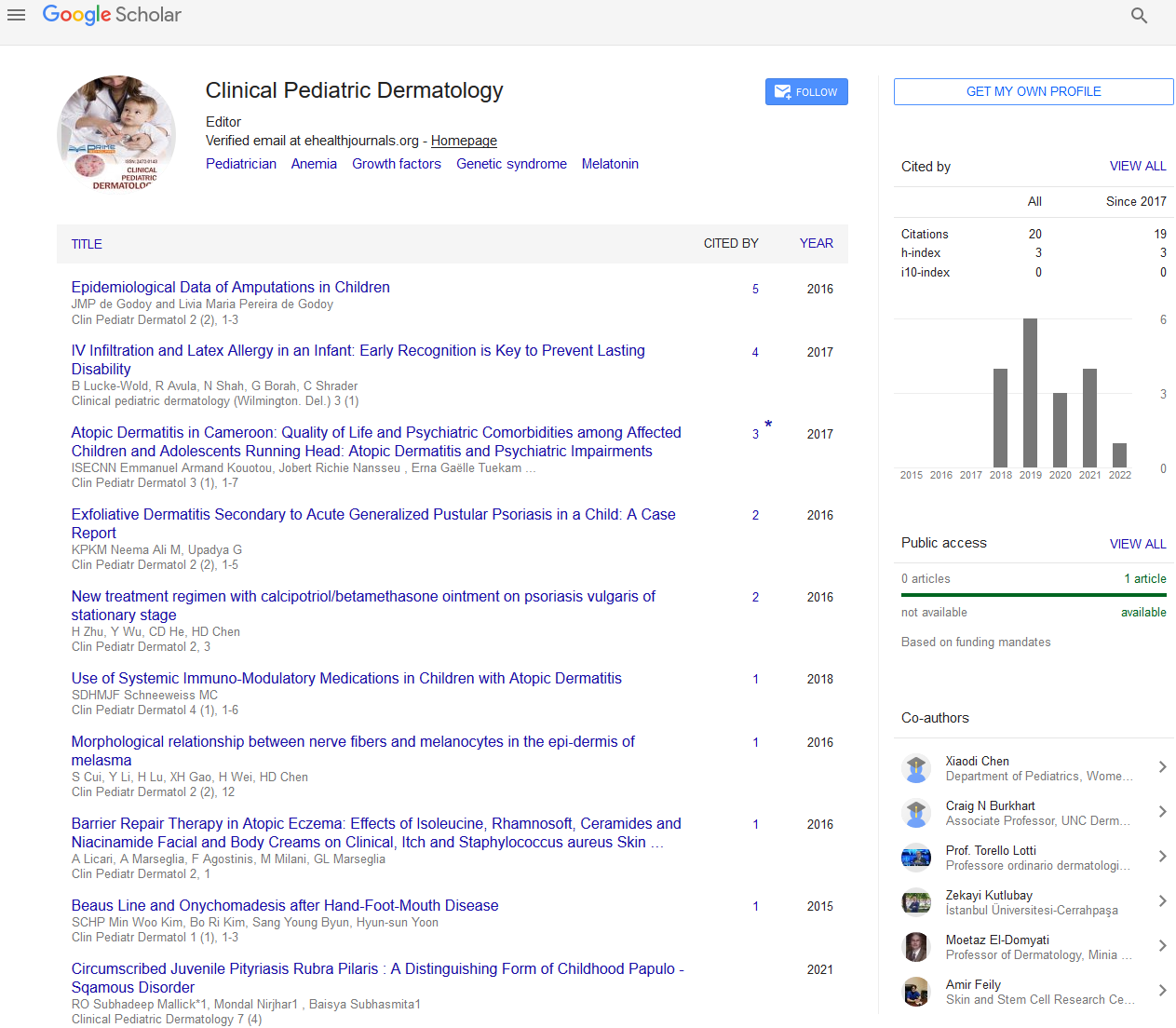Short Communication - (2023) Volume 9, Issue 2
The Part of Eosinophils within the Differential Determination of Provocative Skin Illnesses
Maxwell Alexander Fung*
Department of Dermatology, University of California, USA
*Correspondence:
Maxwell Alexander Fung,
Department of Dermatology, University of California,
USA,
Email:
Received: 31-May-2023, Manuscript No. IPCPDR-23-17102;
Editor assigned: 02-Jun-2023, Pre QC No. IPCPDR-23-17102 (PQ);
Reviewed: 16-Jun-2023, QC No. IPCPDR-23-17102;
Revised: 21-Jun-2023, Manuscript No. IPCPDR-23-17102 (R);
Published:
28-Jun-2023, DOI: 10.36648/2472-0143.9.2.13
Introduction
Skin diseases, also known as dermatological disorders or dermatoses,
encompass a broad range of conditions that affect the skin’s
health, appearance, and function. From minor irritations to severe
chronic ailments, these conditions can significantly impact an individual’s
quality of life and self-esteem. While modern medicine has
made tremendous strides in treating and managing skin diseases,
it is crucial to delve into the root causes to better understand their
development and find effective preventive measures [1-3]. In this
article, we will explore the various causes of skin diseases, including
genetic factors, environmental influences, lifestyle choices,
and underlying medical conditions. By gaining insights into these
factors, we can make informed decisions to protect our skin and
minimize the risk of developing skin diseases. Genetics plays a
crucial role in determining an individual’s susceptibility to certain
skin diseases. Hereditary conditions can be passed down through
generations, making some individuals more prone to specific dermatological
disorders. Atopic dermatitis is a chronic inflammatory
skin condition that often runs in families. Individuals with a family
history of eczema have a higher risk of developing the condition
due to genetic variations in the skin’s barrier function and immune
response. Psoriasis is another chronic inflammatory disorder with
a strong genetic component. Multiple genes are associated with
psoriasis development, and if an individual has a family member
with psoriasis, their risk of developing the condition increases. Vitiligo
is an autoimmune skin disorder that causes the loss of skin
colour in patches.
Description
Genetic factors can contribute to the immune system’s malfunction,
leading to the destruction of melanocytes responsible for
producing skin pigmentation. Environmental factors can significantly
impact the health of our skin. Exposure to various elements,
pollutants, and irritants can trigger or exacerbate certain skin
conditions. Prolonged and unprotected exposure to UV radiation
from the sun or tanning beds can lead to skin damage, sunburn,
premature aging, and an increased risk of skin cancer. Airborne
pollutants, such as particulate matter, ozone, and Volatile Organic
Compounds (VOCs), can settle on the skin and contribute to oxidative
stress and inflammation, leading to various skin issues. Extreme
temperatures, humidity, and weather conditions can affect
the skin’s moisture levels, potentially exacerbating conditions like
eczema and rosacea. Allergens, such as pollen, pet dander, dust
mites, and certain foods, can trigger allergic reactions in susceptible
individuals, causing hives, rashes, or exacerbating existing
skin conditions. Certain lifestyle habits can impact the health and
appearance of the skin. Making mindful choices can go a long way
in preventing or managing skin diseases. A balanced diet rich in
essential nutrients, antioxidants, and omega-3 fatty acids promotes
healthy skin. On the other hand, excessive consumption of
processed foods, sugary snacks, and unhealthy fats can contribute
to inflammation and skin problems [4,5]. Proper hydration is essential
for maintaining skin elasticity and preventing dryness. Insufficient
water intake can lead to dry, flaky skin and potentially
worsen conditions like eczema and psoriasis. Smoking damages
collagen and elastin fibres, leading to premature aging, wrinkles,
and an increased risk of skin cancer.
Conclusion
Skin diseases can be caused by a complex interplay of genetic, environmental,
lifestyle, and medical factors. Understanding these
causes is crucial for early detection, effective management, and
prevention of skin conditions. Maintaining a healthy lifestyle, protecting
the skin from harmful environmental influences, and seeking
timely medical attention for underlying medical conditions are
essential steps in safeguarding skin health. With proper care and
awareness, we can significantly reduce the burden of skin diseases
and enjoy healthy, radiant skin throughout our lives.
Acknowledgement
None.
Conflict Of Interest
The author’s declared that they have no conflict of interest.
References
- Hoesli SR, Bruggen MC, Feldmeyer L, Simon HU, Simon D (2021) Eosinophils in skin diseases. Semin Immunopathol 43(3): 393-409.
[Crossref] [Google Scholar] [PubMed]
- Long H, Zhang G, Wang L, Lu Q (2016) Eosinophilic skin diseases: A comprehensive review. Clin Rev Allergy Immunol 50(2): 189-213.
[Crossref] [Google Scholar] [PubMed]
- Peckruhn M, Elsner P, Tittelbach J (2019) Eosinophilic dermatoses. J Dtsch Dermatol Ges 17(10): 1039-1051.
[Crossref] [Google Scholar] [PubMed]
- Wu D, Molofsky AB, Liang HE, Gonzalez RRR, Jouihan HA, et al. (2011) Eosinophils sustain adipose alternatively activated macrophages associated with glucose homeostasis. Science 332(6026): 243-247.
[Crossref] [Google Scholar] [PubMed]
- Marzano AV, Genovese G (2020) Eosinophilic dermatoses: Recognition and management. Am J Clin Dermatol 21(4): 525-539.
[Crossref] [Google Scholar] [PubMed]
Citation: Fung MA (2023) The Part of Eosinophils within the Differential Determination of Provocative Skin Illnesses. Clin Pediatr Dermatol. 9:13.
Copyright: © 2023 Fung MA. This is an open-access article distributed under the terms of the Creative Commons Attribution License, which permits unrestricted use, distribution, and reproduction in any medium, provided the original author and source are credited.

